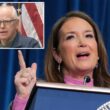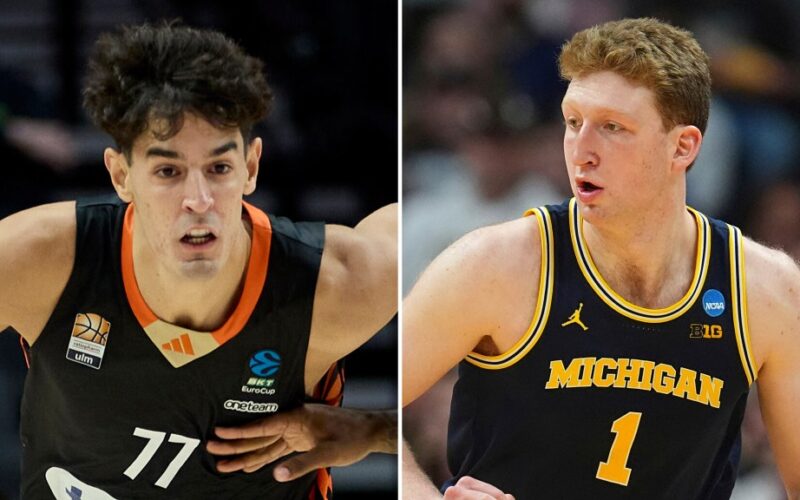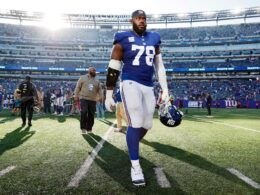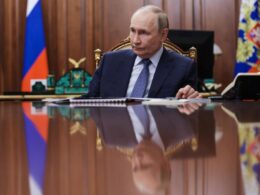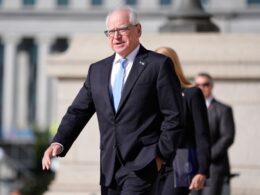With an anti-Zionist poised to become our next mayor, antisemites gunning down and firebombing Jews in America’s streets, and Israelis still dying in their country’s version of a forever war, it has been a tough stretch for Jewish New Yorkers. But relief from this drumbeat of despair has emerged from an unexpected source.
In the recently completed NBA draft the Brooklyn Nets chose two Israeli hoopsters in the first round. Ben Saraf is a 6-foot-6 point guard, known for his passing skills, who has played professionally in Israel and Germany since he was 16-years-old.
Danny Wolf, a 7-footer who was born in Illinois, displayed exceptional ball handling, passing, and rebounding skills while starring at Yale and the University of Michigan. He keeps kosher and became an Israeli citizen to compete in the U20 European championship.
Having Saraf and Wolf land in Brooklyn seems bershert, as we fate-obsessed Jews like to say. Jews on the city’s asphalt playgrounds played such a significant role in basketball’s development, that the sport was once known as “The Jewish Game.”
In the heyday of New York City college hoops, schools featured Jewish players. In 1950 CCNY won both the NIT and NCAA championships, with a squad dominated by Jews and African-Americans. Rudy LaRusso and Max Zaslofsky of Brooklyn, and Dolph Schayes of the Bronx, were a few of the Jewish standouts of the early NBA.
I was a bench-warming city high school player in the 1970s. By then there were few Jewish basketball role models for me to emulate.
My exposure to Jewish-basketball’s golden age was through Nat Holman, the “Mr. Basketball” of the 1920s. He founded the summer camp I attended, where I was captivated by his stories of the rough and tumble playgrounds of the Lower East Side.
I have many Israeli relatives and the Jewish-hoops connection translates to them. My nephews peppered me with questions about the NBA when I visited them.
“Have you seen LeBron play in person?” They excitedly asked.
“What is it like to watch a game at the Garden?”
Israel has a robust professional league and in one of my trips I attended a game at Maccabi Tel Aviv’s 10,383-seat arena. Although most of the players were African-Americans from the United States, the fans were as rabid as any NBA crowd. Israelis still talk about the 1977 Maccabi team that won the European Championship, with an all-Israeli lineup.
My Israeli relatives traveled to Brooklyn for my wedding, 10 years ago. For my bachelor party my nephews took me to a Nets game at Barclays Center.
They expressively exchanged observations in Hebrew and English about back door plays and double teams. I was embarrassed that they knew more about the game than I did.
Since 10/7 the nephews who treated me to the Nets game have each spent several hundred days serving as reservists in Lebanon, Gaza and the West Bank. I have visited Israel twice since the terror attack, and haven’t had a single discussion about the NBA or European Championships.
I am reminded of Israel every day by the “Free Palestine” signs and keffiyeh-garbed pedestrians, in my Park Slope neighborhood. It is emotionally wearing to be confronted with expressions of hatred for the country my nephews are risking their lives to defend.
I have mixed feelings about how Israel has conducted its war against Hamas. I mostly want the fighting to end so that my nephews are out of harm’s way, the beleaguered civilians of Gaza can get the relief they deserve, and Jewish and Muslim New Yorkers can begin a respectful exchange about how 10/7 and its aftermath has impacted our respective communities.
I am excited about rooting for the newest Nets. It will be refreshing to have an Israel-related interest that doesn’t involve college encampments, missiles, or the fear of recognizing a name on the IDF casualty lists.
Some Brooklynites might object to the presence of Israelis on the hardwood. But I have a more hopeful vision of how things will play out.
I imagine Saraf and Wolf as part of a team of players from diverse backgrounds, dedicated to a selfless brand of basketball, emphasizing passing, picking, and switching on defense. I see myself cheering them on alongside Muslims, Hindus, Sikhs, Christians, Buddhists, Deists, and all manner of basketball fans—united in our appreciation of teamwork; united in our love of roundball; united as New Yorkers.
Krull is a lawyer and writer.



